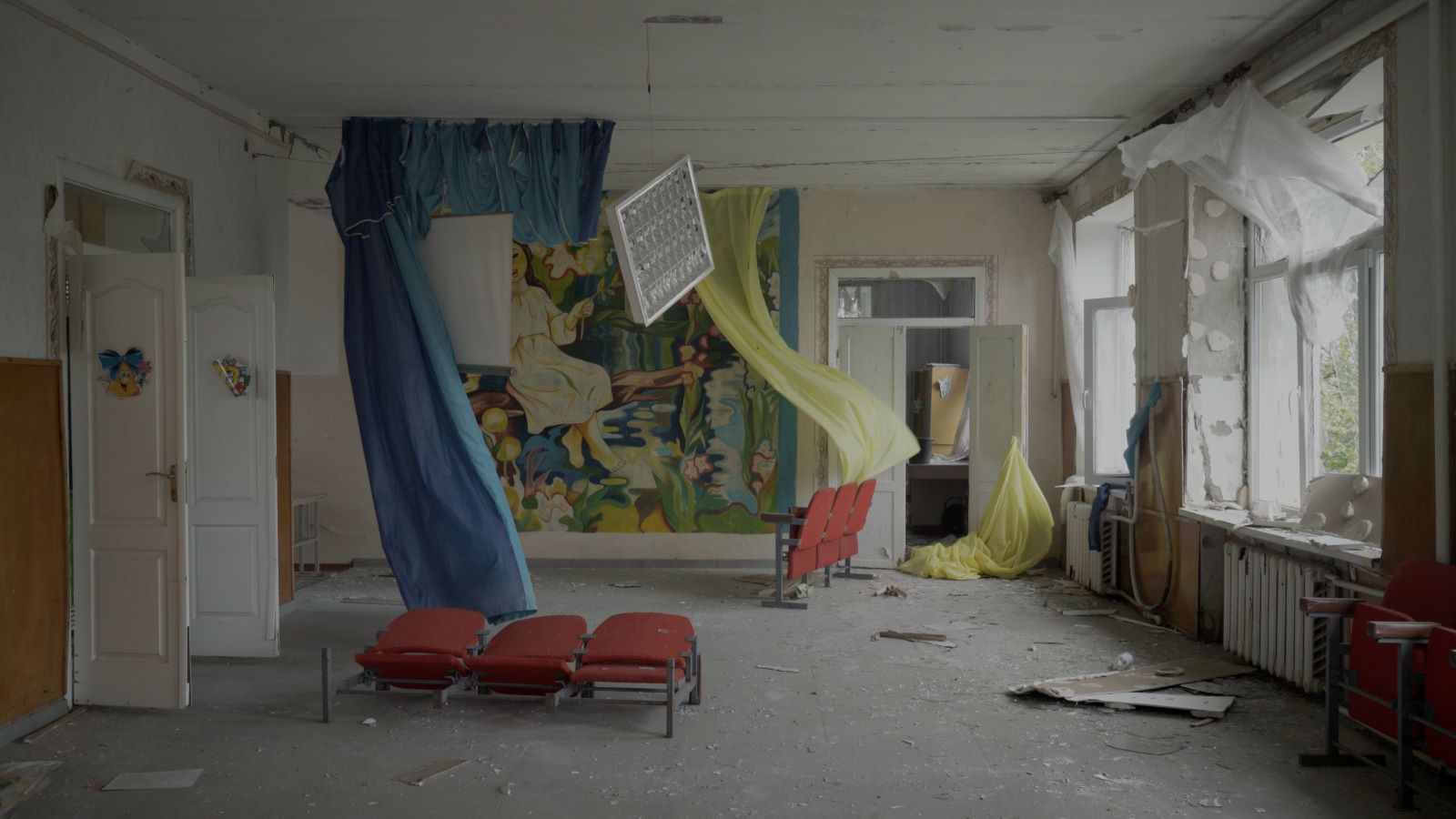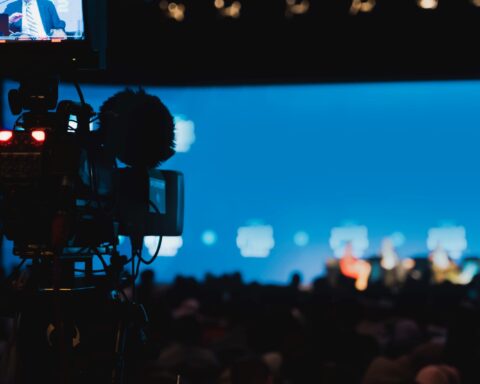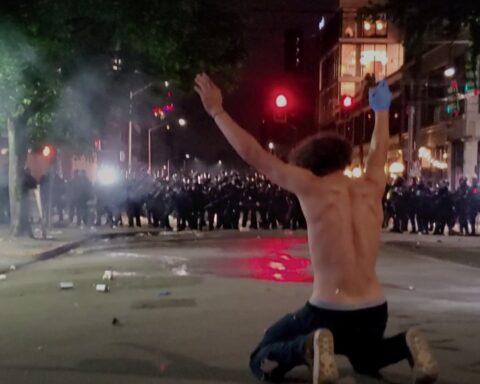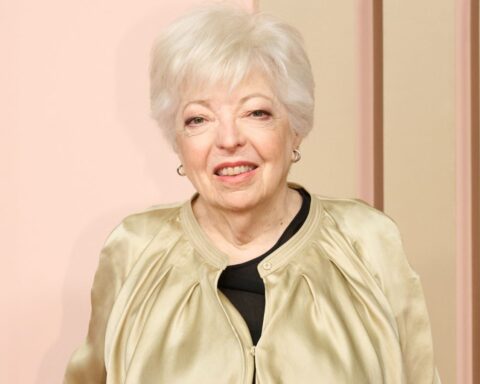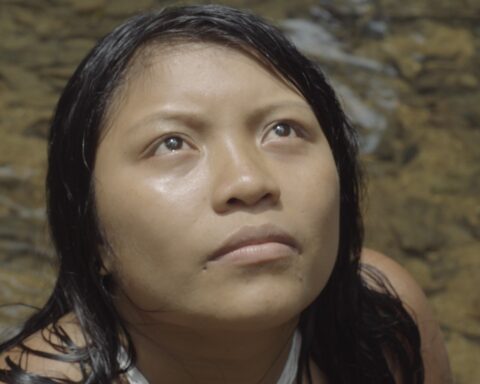Surreal, poetic, disturbing, and richly conveyed, Oksana Karpovych’s film Intercepted provides a unique rumination upon the conflict in her native Ukraine that escalated in early 2022. Soon after the Russians invaded, the Ukrainian military began showcasing intercepted phone calls from these occupying soldiers on the ground who were reaching their loved ones back home. Karpovych (Don’t Worry, the Doors Will Open) lets audiences listen in to these covert recordings. We hear universal themes, from nagging mothers to the libidinous teasing of girlfriends or wives, mixed in with appalling levels of xenophobia, rage, and bitter feelings expressed on what was presumed a private line.
Karpovych places these intercepted conversations atop carefully photographed images of destruction as ragged curtains blow or shards of glass litter what was once a family room, a kitchen, or a children’s bedroom. It’s a powerful testimony of the lives of Ukrainians where their voices are never heard, and the ghosts of their past lives inhabit every frame.
We spoke to Karpovych via Zoom prior to the film’s Canadian Premiere at Hot Docs. The film also screens at Vancouver’s DOXA.
POV: Jason Gorber
OP: Oksana Karpovych
The following has been edited for clarity and concision
POV: You were born in Ukraine and educated in part in Montreal. Where you were when this current phase of the war started, and where you were when you started hearing these messages from Russia?
OP: I do have a film education from Montreal, but I also have an education from Ukraine in cultural studies. With my work in documentary, I think that I actually continue doing cultural studies. My first degree gave me so much knowledge and tools to use in my filmmaking. They are not practical tools, perhaps, and rather theoretical or philosophical, but they are no less important than my filmmaking skills that I learned in Montreal.
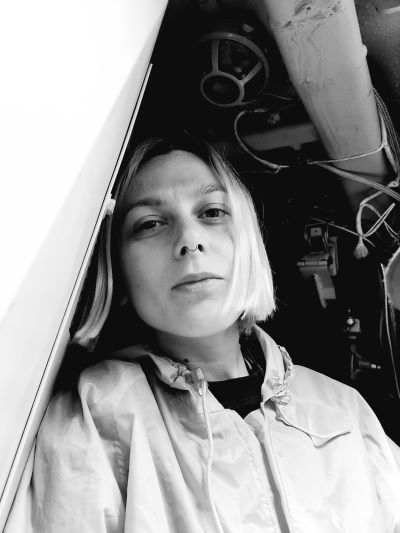
When the full scale invasion started, I was actually in Ukraine. I was in the process of working on my second feature length documentary, and I decided to move back to Ukraine so that I could focus on that project. But then the total invasion started, and I put that project on the side. As the conflict escalated, I began working as a local producer with the international reporters in the first six weeks of the invasion. I had never done that job before, but there was so much media attention and we realized right away that the war that was happening was not just happening physically. There was also a considerable information war taking place. As a person who has experience in filmmaking, I thought that I could be very helpful for the international reporters who came to Ukraine to report about everything that was happening. After some of the regions were liberated, we continued to report during the aftermath about the occupation, the mass killing of the civilians, and all that happened in many regions.
Normally, I love talking to people, and I collect oral histories. But while working as a local producer, I would often need to simply stand and wait until the reporters would finish livestreaming. Sometimes it would take hours simply in one place. That experience of standing, watching a single scene, often a crime scene, from one specific perspective, without engaging with people around me, in a way inspired the visual style of this film.
In parallel with my job as a local producer, I developed a habit of listening to the intercepts. I discovered them online, on the official YouTube channels of the Ukraine security services. Right away, I was fascinated with this material. The stories sounded crazy in a way that I didn’t know that such things could even exist. I thought what the Ukraine security services were doing by publicising these intercepted messages was brilliant. I think they realized how much the Russian soldiers who came to invade Ukraine were misinformed about their mission, the purposes of that so-called “special operation” and the way it was all unfolding. And, of course, we are hearing how their families in Russia at the same time are so radically misinformed. I think the primary audience of those posts on YouTube were actually Russians. I think the Ukraine security services sharing those intercepted conversations tried to show the Russian population the truth about what was happening.
POV: Which brings us to all kinds of very interesting cultural questions about your film because the primary audience of your film also shifts. Many people in North America won’t have heard these conversations. I know almost everybody in Ukraine was going through them all, and many in Russia think that they’re fake and they’re manipulative psy-ops. Can you talk about your own push and pull about aestheticizing, about creating art, about creating a film to be experienced in a theatre with an audience, about something so specific and so tragic?
OP: One of the reasons we went with our cinematographer Christopher Nunn was, let’s say, a political reason. Working with the journalists from around the world at times was inspiring; at others, it was quite unnerving. I would see the source of the news they were reporting, and which images were so widely spread all over the globe. Often they were not really explaining or sharing the experience of us in Ukraine, only capturing the surface. The news, the journalists, were always looking for the most tragic and scandalous and provocative things. These news-bites cannot truly share the depths and complexity of my experience and the experience of my people. Worst of all, the accumulation of the images of violence pushes people away from understanding what is happening.
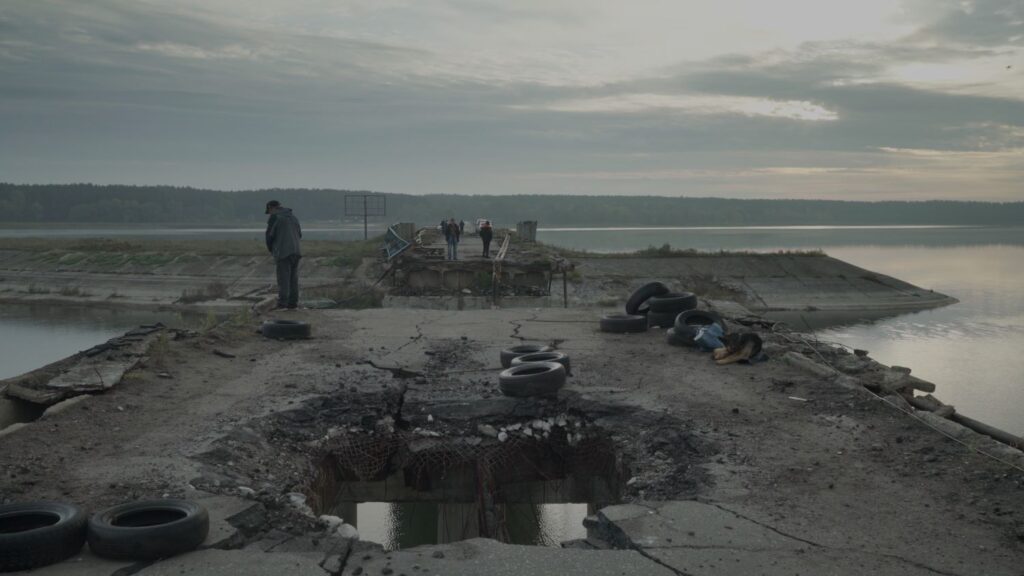
POV: But what’s fascinating about your film is that you don’t show the violence, you show the aftermath of violence. We don’t hear from Ukrainians we hear from Russians in Ukraine. This is obviously very deliberate. Can you talk about getting to that stage?
OP: When I try to put myself back in that moment, in those first days and weeks of the invasion, and the time when I arrived to the idea of the film, I often remember a state of being speechless. When I actually talked to people in some of these places, people who survived the attacks or occupation, I remember that their speech was very chaotic, and they were never able to tell a story from the beginning to the end. I was witnessing the discourse of people who were traumatized. It was less than a conversation or monologue—it was always a cry. It made me feel and think that their silence says way more. I also felt that I was not able at that moment to listen to all of these stories, the many testimonies of the crimes and violence the people experienced and survived.
On the other hand, I found what the Russians were saying was as if they were giving me an interview personally, with personal insights into their actions. While many of these intercepted comments were so absurd, they helped me see the reality, with wild justifications for the invasion. The calls were constantly keeping me in this state of cognitive dissonance, and that’s exactly what I tried to recreate in the film.
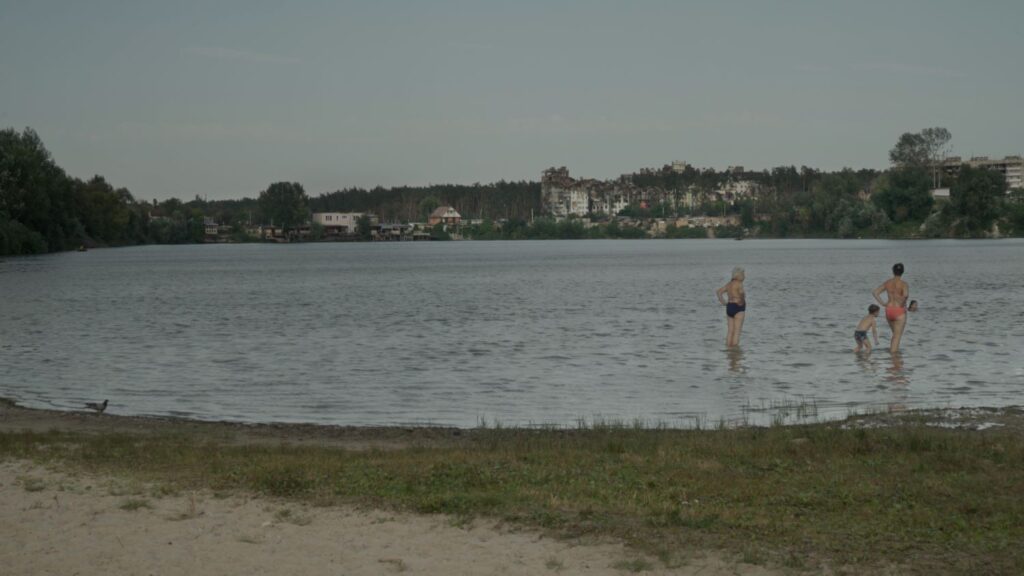
POV: You’re clearly going through hours and hours of recordings. You’re choosing what to play and when to play it, when to place them in the film, editorially. How much of a challenge was it, just emotionally, going through all of the recordings, to select the right ones for a given scene?
OP: I remember listening to that material, intercept by intercept, one by one, every day. I was at an artist’s residence in Paris for two months before we started editing the film and I started listening to them, logging, writing notes. Some I’d heard before shooting the film, but never as a whole, in chronological order. I did this after we shot the film, actually. I remember that it was not very emotional for me because, somehow, I was able to distance myself from that material and look at it from the point of view of a researcher. I was trying to be open minded about the material, and let myself discover the nuances and learn something.
For example, I realized that those conversations tell us a lot about the nature of the invasion as an act of Imperialism. There were so many mentions of the previous military invasions, operations, of the Russians in other places. There were many conversations about Chechnya, about Syria, mentioning of the Second World War and Afghanistan. It made me think that what was happening was just one of the many military actions of Russia. So there were things like this that were not emotional, but rather intellectual.
I was able to take this stance and not focus too much on the emotional aspect of these conversations and of the hatred that was expressed in them. I worked with an editor, Charlotte Tourrès. She’s French and she doesn’t speak Russian, so I needed to translate all of the material into French. Because there was so much material, and it was too expensive for the production to translate everything, so we had to choose. We made those choices based on my early selections and on all of these nuanced things that I recognized in the material, themes and sub-themes that interested me.
As for the way we matched it to certain images, this film was a real puzzle. It’s so minimalist that it doesn’t seem as complex, or anywhere near as complicated as it was in the making. The editing of this film was probably one of the most challenging things I’ve ever done in my life, in all possible aspects. Creatively, intellectually, emotionally, ethically—there were so many choices that we had to make along the process.
From the start of the project is the fact that we never wanted to illustrate with the images what the conversations were talking about. This created a challenge for us – but also the freedom to do whatever we really wanted. The way we wanted to combine the images and intercepts was more associative and philosophical. There were always little hints, little details in the images that would still link the image to what is mentioned or in the conversations, but in an indirect way.
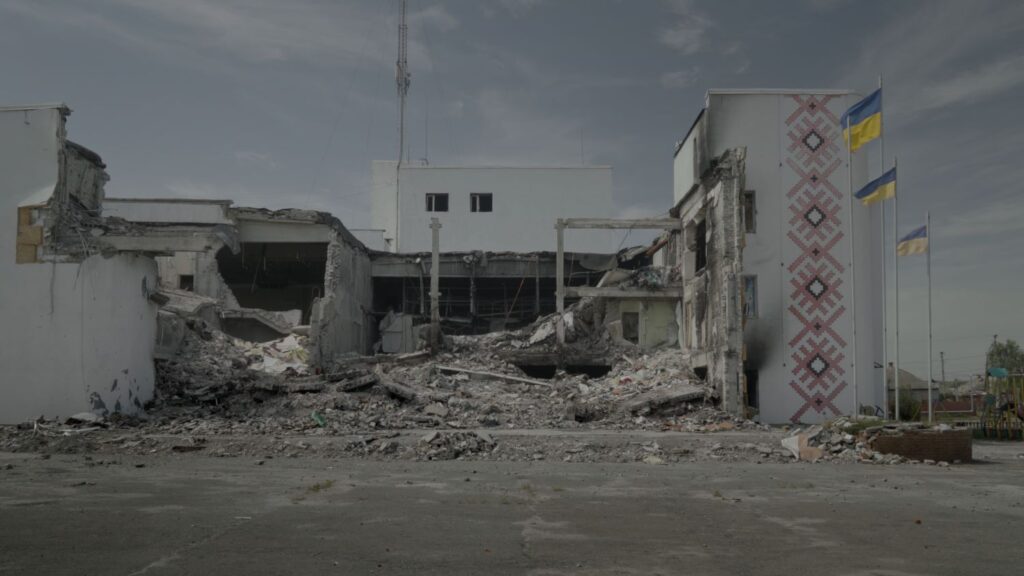
POV: Was there ever a moment that you put the words on top of the image and you realized almost accidentally, before you even knew that those words were going to go with that image, about how closely they would connect?
OP: There were moments when Charlotte would work on her own and I would just come to the edit suite and she would show me the result of her work. I would often be surprised with the way she would match the image and sound. It was a very long and intense process because we spent five and a half months editing this film.
POV: I can see working on this project you becoming almost in some ways more empathetic of those that invaded Ukraine because you’re hearing a soldier’s mother tell things that are clearly lies. The soldier doesn’t necessarily have control of the story that brought him to invade. Were there moments where you not only recognized the challenges of truth in Russia, but in some ways, maybe not justified, but at least humanized those that were committing these atrocities?
OP: When I was working on this, I discovered this paradox. Violence and war, we all know this, have a very strong dehumanizing power in people, on both sides, no matter who is involved. But I think the paradox of the Russian invasion is that the war, in a way, humanizes the soldiers. They arrived in Ukraine already dehumanized, demoralized, and the violence that they experienced, the brutality that they witnessed taught them something and it humanized them. We know it because we hear their families. We understand that their families in Russia are people who haven’t left their homes, their hometowns, who don’t travel, and who don’t see what is happening in reality in Ukraine, who only know about reality from the TV. They are much more dehumanized than the soldiers who are fighting in Ukraine. So, yes, that made me feel a bit more empathetic towards the soldiers, even though they are the people who are physically committing the acts of violence. But to me, there is a hierarchy or gradations of that dehumanization, and the families on the other end of the line back in Russia appeared more dehumanized.
POV: There are moments that are weirdly, darkly humorous, often as absurd as much as it’s horrific to hear.
OP: Definitely. When I first listened to that audio I often laughed, because many of the things says were so absurd. It’s like reading Ionescu, like reading an absurd play. I often had this impression that I was simply listening to an audio book, not real people. There’s a sense of the dramatic and it’s so rich in details [that it would create] vivid images that in my head. Often, they would be surreal, dark and funny at the same time. Looting is one of the bleakest, yet funniest things. . It’s also the one that is the most painful because it shows the extreme banality of the crime. It shows us also this paradoxical thinking of the Russians, when on the one hand, they are such big nationalists, and they are so proud of Russia and they keep saying this to everyone, that Russia is the best. In reality, they lack basic necessities for a decent quality of life. The things that they were impressed with, like the taste of ice cream and juice in Ukraine, is ridiculous.
POV: I was going to say, does Ukraine have particularly good ice cream? Italy has probably better ice cream. Imagine if they travelled there instead!
OP: [Laughs.] Talk of ice cream shows their fascination with little good things. It shows us how uneducated and uncultured these people are. They don’t travel abroad, or they were so young that they didn’t have those experiences. We know the first soldiers, at the beginning, were mostly comprised of young men of 19, 18 years old. I imagine they didn’t see much in their lives yet when they came to invade Ukraine. So in a way, the invasion of Ukraine was a perverted tourism.
POV: You see evidence of people who have lived inside a silo that gives them the lack of intellectual curiosity to go and murder people. On the other hand, some people may say you are giving voice to murderers, to war criminals, that somehow we shouldn’t have to listen to them. Could you talk about how audiences have been responding and, more importantly, how you have been responding to how media has been reporting about this particular phase of the Russian Ukrainian conflict?
OP: I believe that one day, justice will come, and the people who are committing these horrible crimes will respond for their actions. But I think the whole invasion of Ukraine and these specific intercepts are a historical document of dehumanization and fascization of society. I really wanted to create an archive of this. When this is all over, I want this to stay, because we can study this for a very long time and still not figure out how come many people get so dehumanized- Russia has 140 million people. To me, this is a document that needs to stay, that needs to be studied.
I don’t think that by giving voice to the Russians I somehow draw attention to the wrong direction. I also think that we managed to create a document of Ukrainian resistance, even though we don’t hear Ukrainians in the film. We deliberately focused on the civilians. We were not making a film about the military because I believe the Ukrainian military were civilians yesterday. We didn’t choose this war. No one in Ukraine wanted to fight with the Russians. At the moment, people who are fighting at the front, yesterday they were hairdressers, artists, filmmakers, plumbers, all sorts of people, but they were not military, compared to the Russian army. I wanted to show the life of these people also in this crazy new reality and the way they resist by simply maintaining that normality of life.




